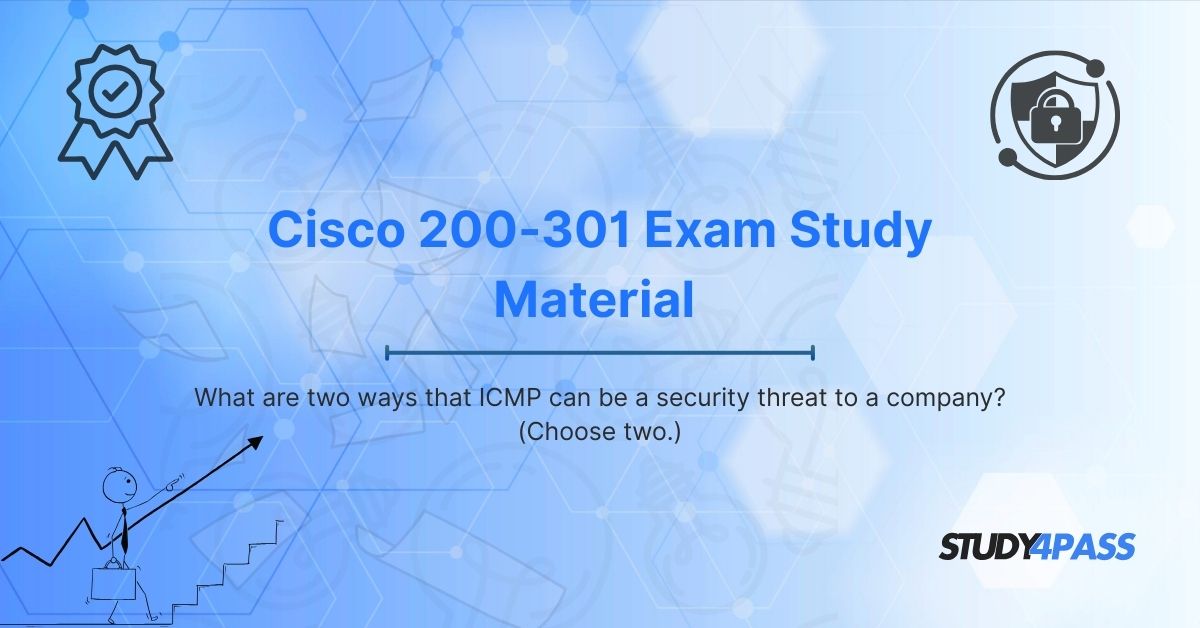Introduction
The Internet Control Message Protocol (ICMP) is a crucial part of the TCP/IP suite, primarily used for diagnostic and error-reporting purposes. While ICMP plays a vital role in network troubleshooting, it can also be exploited by malicious actors to launch cyberattacks. For companies preparing for Cisco certifications like CCNA, CCDA, CCENT, CCNA Security, and CCNA Wireless, understanding ICMP-related security threats is essential.
In this article, we will explore two major ways ICMP can pose a security threat to a company:
- ICMP Flood Attacks (Ping Flood)
- ICMP Redirect Attacks
Additionally, we will discuss mitigation techniques and recommend Study4Pass as an excellent resource for Cisco certification preparation.
ICMP Flood Attacks (Ping Flood)
What is an ICMP Flood Attack?
An ICMP Flood Attack, also known as a Ping Flood, is a type of Denial-of-Service (DoS) attack where an attacker overwhelms a target system with a high volume of ICMP Echo Request (ping) packets. The goal is to consume network bandwidth and system resources, making the target unresponsive to legitimate traffic.
How It Works?
- The attacker sends a massive number of ICMP Echo Request packets to the victim’s IP address.
- The victim’s system attempts to respond with ICMP Echo Reply packets, consuming CPU, memory, and bandwidth.
- If the attack is large enough (often amplified via botnets), it can completely saturate the network, leading to downtime.
Real-World Example: Smurf Attack
A Smurf Attack is a variant of ICMP flooding where the attacker spoofs the victim’s IP address and sends ICMP requests to a broadcast address. All devices on the network respond to the victim, amplifying the attack.
Impact on Companies
- Network Downtime: Critical services become unavailable.
- Bandwidth Consumption: Legitimate traffic is slowed or blocked.
- Resource Exhaustion: Servers and routers may crash due to excessive load.
Mitigation Strategies
- Rate Limiting ICMP Traffic: Configure routers to limit ICMP packet rates.
- Disabling ICMP Echo Replies: Block unnecessary ICMP responses at the firewall.
- Implementing DoS Protection: Use intrusion prevention systems (IPS) to detect and block flood attacks.
ICMP Redirect Attacks
What is an ICMP Redirect Attack?
An ICMP Redirect Attack occurs when an attacker sends fraudulent ICMP Redirect messages to a host, tricking it into sending traffic through a malicious router. This allows the attacker to intercept, modify, or drop sensitive data.
How It Works?
- The attacker must be on the same subnet as the victim.
- The attacker sends a fake ICMP Redirect message, claiming that a better route exists via their system.
- The victim’s device updates its routing table, redirecting traffic to the attacker’s machine.
- The attacker can now perform Man-in-the-Middle (MitM) attacks, eavesdropping on communications.
Real-World Example: Router Exploitation
If an attacker compromises a router, they can send ICMP redirects to connected devices, rerouting traffic for malicious purposes such as credential theft or data exfiltration.
Impact on Companies
- Data Interception: Sensitive information (passwords, emails) can be stolen.
- Traffic Manipulation: Attackers can inject malware or modify transactions.
- Network Instability: Incorrect routing can cause connectivity issues.
Mitigation Strategies
- Disabling ICMP Redirects: Configure hosts to ignore ICMP redirect messages.
- Using Secure Routing Protocols: Implement OSPF or EIGRP with authentication.
- Network Segmentation: Limit broadcast domains to reduce attack surfaces.
Best Practices to Secure ICMP Traffic
To protect against ICMP-based threats, companies should:
- Filter Unnecessary ICMP Traffic at firewalls (e.g., block external pings).
- Monitor ICMP Activity using SIEM tools for unusual patterns.
- Apply Security Patches to prevent exploitation of known vulnerabilities.
- Use Encryption (IPSec, VPNs) to prevent eavesdropping on redirected traffic.
Why Choose Study4Pass for Cisco Certification Preparation?
If you're preparing for CCNA, CCNA Security, or CCNA Wireless, Study4Pass offers:
- Up-to-Date Study Materials aligned with the latest exam objectives.
- Practice Tests & Labs to reinforce learning.
- Expert Guidance from certified professionals.
- Affordable & Flexible Learning options.
Visit Study4Pass today to boost your networking career!
Conclusion
ICMP is essential for network diagnostics but can be weaponized for DDoS attacks (Ping Floods) and traffic hijacking (ICMP Redirects). Companies must implement proper filtering, monitoring, and encryption to mitigate these risks. For aspiring network professionals, mastering these concepts is crucial for exams like CCNA and CCNA Security, and Study4Pass provides the perfect resources to succeed.
By understanding and securing ICMP, organizations can maintain a robust and resilient network infrastructure.
Special Discount: Offer Valid For Limited Time “200-301 Study Exam Prep Practice Tests”
Actual Exam Questions For Cisco's 200-301 Latest Version
Sample Questions For Cisco 200-301 Practice Test
1. What are two ways that ICMP can be a security threat to a company? (Choose two.)
A) ICMP can be used for network troubleshooting.
B) ICMP can be exploited in a Smurf attack to flood a network.
C) ICMP can be used for ping sweeps to discover live hosts.
D) ICMP ensures secure data transmission.
2. Which of the following are security risks associated with ICMP? (Choose two.)
A) ICMP helps in routing optimization.
B) ICMP can be used in a Ping of Death attack to crash systems.
C) ICMP provides encryption for data packets.
D) ICMP can facilitate reconnaissance attacks by scanning networks.
3. How can ICMP pose a threat to a company’s network security? (Choose two.)
A) By enabling faster internet speeds.
B) By allowing attackers to perform ICMP redirect attacks to manipulate routing.
C) By preventing unauthorized access.
D) By being used in ICMP tunneling to bypass firewalls.
4. Which two ICMP-related attacks can compromise a company’s security? (Choose two.)
A) ICMP echo replies improving network performance.
B) ICMP flood attacks overwhelming a target with echo requests.
C) ICMP timestamp replies for time synchronization.
D) ICMP-based traceroute for network mapping by attackers.
5. What are two security concerns involving ICMP? (Choose two.)
A) ICMP supports IPv6 addressing.
B) ICMP can be abused in a DoS attack by flooding a host with unreachable packets.
C) ICMP helps in load balancing.
D) ICMP can leak network topology information to attackers.


